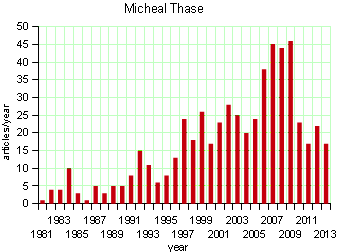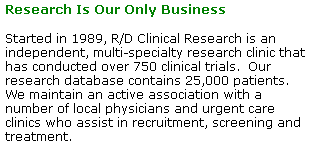Is research a business? I wouldn’t have thought that [though I’ll admit that one of the things that put me off of a research career was seeing the amount of time my mentors spent worrying about funding]. That blurb is from the web site of R/D Clinical Research, a clinical research center in Lake Jackson, Texas where Rakesh Jain, MD [Medical Director, Psychiatry] works.
Maybe I ought to back up. A few years back, not long after the Chairman of the Psychiatry at the University I am affiliated with was sent packing for undeclared pharmaceutical income, I started looking into that whole psychiatric medication scene. As I read more and more of the studies, I realized how downright corrupt things were [I can’t think of any nicer way to say that]. I wondered from drug to drug, not finding a single one where things were altogether kosher. But I was looking backwards, at drugs already on the market, some already out of patent. I felt like somebody should’ve been looking at the time, and resolved to do so myself if one came along. But since then, the "pipeline" has gone dry and the only ones were Viibryd and Latuda, already FDA approved by the time they passed my way. Then last week, I heard about Vortioxetine [see beyond unacceptable…, way past time…].
I had listed all the studies [way past time…] and then this morning, chasing something unrelated, I was looking at the ProPublica web site and ran across this article [Dollars for Docs Mints a Millionaire] and recognized a name [Jain]. I had seen it on a Vortioxetine article published last year, a negative study and the first US Clinical Trial of the drug:
A randomized, double-blind, placebo-controlled 6-wk trial of the efficacy and tolerability of 5 mg vortioxetine in adults with major depressive disorder
by Rakesh Jain1,2, Atul R. Mahableshwarkar3, Paula L. Jacobsen3, Yinzhong Chen3, and Michael E. Thase4
International Journal of Neuropsychopharmacology. 2013 16:313–321.
1 R/D Clinical Research Inc., Lake Jackson, TX, USA
2 University of Texas Medical School at Houston, Houston, TX, USA
3 Takeda Global Research and Development Center, Deerfield, IL, USA
4 University of Pennsylvania, Philadelphia, PA, USAVortioxetine [Lu AA21004]) is a multi-modal antidepressant in clinical development for the treatment of major depressive disorder [MDD]. The current study evaluated the efficacy and tolerability of 5 mg vortioxetine compared to placebo after 6 wk of treatment in adults with MDD in an out-patient setting. Adults aged 18–75 yr, with a diagnosis of MDD and a baseline Montgomery–Asberg Depression Rating Scale [MADRS] total score>30, were randomized to receive either 5 mg vortioxetine or placebo over 6 wk, followed by a 2-wk medication-free discontinuation period. The primary efficacy measure was change from baseline in Hamilton Rating Scale for Depression [HAMD]-24 total score at week 6 compared to placebo. Additional measures included response and remission rates, Clinical Global Impression Scale – Improvement scores, HAMD-24 total score in subjects with baseline Hamilton Anxiety Scale [HAMA]>19 and MADRS-S total score. Adverse events [AEs] were assessed throughout the study. A total of 600 adults were randomized. There were no significant differences in efficacy measures between subjects in the 5 mg vortioxetine and placebo groups at week 6. HAMD-24 total score in subjects with baseline HAMA>19 in the 5 mg vortioxetine group was improved at weeks 3–6 compared to the placebo group [nominal p value<0.05]. The most common AEs for the vortioxetine and placebo groups were nausea [19.1 and 9.4%], headache [17.1 and 15.1%] and diarrhoea [11.4 and 7.0%], respectively. In this study of adults with MDD, 5mg vortioxetine did not differ significantly from placebo in reducing depression symptoms after 6 wk of treatment.
Received 28 February 2012; Reviewed 10 May 2012; Revised 31 May 2012; Accepted 7 June 2012; First published online 11 September 2012. This trial has been registered at clinicaltrials.gov #NCT00672958.
… Draud’s $1 million in drug company earnings is probably a minimum figure. Some of the seven companies he represented have reported their payouts for only a short time. And Draud has separately disclosed ties with at least four additional companies that haven’t revealed how much they pay speakers.
Draud has friends among the other highest-paid doctors in the database. He teaches continuing medical education courses with fellow psychiatrists Rakesh Jain and Vladimir Maletic. Jain, of Lake Jackson, Texas, has earned $582,049. Maletic, of Greer, S.C., made $527,850 , according to Dollars for Docs. Both also speak for other companies that keep their payments private. Draud did not return several messages seeking comment. But in an interview, Jain said he loves teaching and delivers the same lectures about drugs and medical conditions regardless of whether a drug company is paying him. “I am not a marketer, I am an educator,” Jain said. In a later email, Jain said he is proud of his collaboration with Draud. “He’s been fair, balanced and is wickedly smart. And I like smart people who serve community needs”…
Texas psychiatrist Jain acknowledges the excesses of the past and said he does not excuse them. But he said he sees real value in the new brands because they give psychiatrists options if their patients are not responding to older drugs. He said he has recently spoken on behalf of Forest’s antidepressant Viibryd, Merck’s antipsychotic Saphris, Lilly’s ADHD drug Strattera, Pfizer’s antipsychotic Geodon and its antidepressant Pristiq.
Having the financial support of drug companies does not lessen the value of this teaching, he said. Jain’s tally in Dollars for Docs does not reflect his work with another group that is heavily sponsored by drugmakers. Jain, top-paid speaker Draud and Maletic all serve on the advisory board and steering committee of the U.S. Psychiatric and Mental Health Congress, which will hold its annual convention in Las Vegas in September and October. Maletic is the 2013 program chairman…
The congress is owned by North American Center for Continuing Medical Education, LLC, a for-profit New Jersey company that provides continuing medical education courses. Health professionals must take such classes periodically to retain their licenses. Draud, Jain and Maletic also teach classes for the company…
Acknowledgements
This study was sponsored by the Takeda Pharmaceutical Company Ltd as part of a joint clinical development programme with H. Lundbeck A/S. Assistance with writing and manuscript preparation was provided by Sara Sarkey, PhD, an employee of Takeda Pharmaceuticals. The authors are entirely responsible for the scientific content of this paper.Statement of Interest
R. J. has been a consultant for Addrenex, Forest, Eli Lilly, Merck, Pamlab, Pfizer, Shionogi, Shire, Sunovion and Takeda. R. J. has received research funding sup- port from AstraZeneca, Forest, Eli Lilly, Pfizer, Shire and Takeda. R. J. has received honoraria from Addrenex, Forest, Eli Lilly, Merck, Pamlab, Pfizer, Shionogi, Shire and Sunovion. R. J. has participated in speaker/advisory boards for Addrenex, Forest, Eli Lilly, Merck, Pamlab, Pfizer, Shionogi, Shire, Sunovion and Takeda. A. M., P. J. and Y. C. are employees of Takeda Global Research and Development Center. M. T. has been a consultant/advisor for Alkermes, AstraZeneca, Bristol-Myers Squibb, Eli Lilly, Dey Pharma, Forest, Gerson Lehman Group, GlaxoSmithKline, Guidepoint Global, Lundbeck, MedAvante, Merck, Neuronetics, Novartis, Otsuka, Ortho-McNeil, Pamlab, Pfizer, PGx Health, Shire, Supernus, Takeda and Transcept. M. T. has received grant support from the Agency for Healthcare Re- search and Quality, Eli Lilly, Forest, GlaxoSmithKline, National Institute of Mental Health, Otsuka and Sepracor. M. T. has participated as a speaker for AstraZeneca, Bristol-Myers Squibb, Dey Pharma, Eli Lilly, Merck and Pfizer. M. T. has equity holdings in MedAvante and receives royalties from the American Psychiatric Foundation [Guilford Publications].
If you’ve made it this far, my apologies for the OCD detail. In case my question got lost along the way. It was Is research a business? In this case, there’s no question that it’s a business. The question is really Is this research? I would doubt that the two non-Takeda full-time employees met the subjects, reviewed the study’s raw data, or wrote the article. I would be surprised to find that the presenter was involved with the study before Takeda/Lundeck later decided to have it presented. I have come to think based on what I see every time I go through the available information on this kind of clinical trial that any missing information [principle investigator, results in clinicaltrials.gov, etc.] or comments like "Assistance with writing and manuscript preparation was provided by Sara Sarkey, PhD, an employee of Takeda Pharmaceuticals" should be taken as a sign of deceitful science and treated accordingly. Likewise, I question if industry run studies like this should even be published in academic journals.


Six week trial?
Six weeks?
A wake-up call to drugmakers and prescribers:
Nobody knows *squat* after six weeks.
Not squat!
Duane
And some of the professionals who buy into this wonder why some of us have lost complete trust with this stuff ?
Six freakin’ weeks!
Duane
Go ahead, Joel.
Blast away against antipsychiatry.
Duane
“Recruiting Human Subjects-Pressures in Industry-Sponsored Clinical Research” HHS
https://www.oig.hhs.gov/oei/reports/oei-01-97-00195.pdf
And Duane, who is to say a subject is in just one clinical trial it might be an endless chain. The subjects might be the last to know:
http://www.hhs.gov/ohrp/policy/engage08.html
I’m as incensed as you are about the abysmal level of “research”. But I have two thoughts:
1. Is it possible for someone who still has a soul to use these research factories to do good work? It seems to me there’s nothing innately evil in research.
2. Academia is just as cutthroat and corrupt. “Publish or perish” is a lot worse than “Publish or make less money”.
PsychPractice,
“1. Is it possible for someone who still has a soul to use these research factories to do good work? It seems to me there’s nothing innately evil in research.”
I think that’s a fair point. My concern is not so much in the data collection and trial conduct. But I worry about the recruited population. For example, R/D Clinical Research, advertises “Our research database has 25,000 patients.” suggesting to me that when a study comes around, they start calling. In this study, in six weeks, the mean HAMD-24 fell from ~32 to ~18 WITH PLACEBO. What kind of depressive cohort is that! The other worry is of course messing with the data after it’s in, not the CRC’s fault. So My main concern about CRCs is recruitment and what happens between the data and the article. So I take your point.
Prozac was originally tested as an anti-hypertensive (blood pressure) drug; then an anti-obesity drug. It failed in both areas. Then five volunteers were said to be helped for mild depression, and the rest was history. 25 years later, we still don’t know how Prozac works (doesn’t work, induces suicide, etc). –
http://www.dailymail.co.uk/health/article-2275333/Prozac-Its-brought-relief-millions-linked-suicide-low-libido-birth-defects.html#axzz2KNt7FK00
And approvals based on short clinical trials (six weeks) are unfortunately not uncommon. Look no further than Paxil.
These mind-altering drugs, referred to as “medicines” are a scam.
Duane